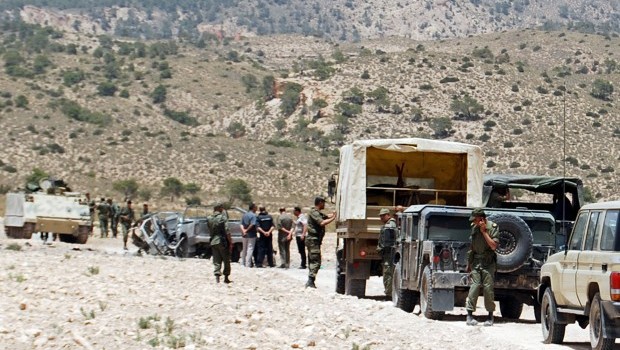
Tunisian army stand guard near a demolished vehicle following a roadside bomb in the mountainous border region near Algeria where security forces have been hunting Al-Qaeda linked jihadists, on June 6, 2013. Source: AFP Photo/Abderrazek Khilfi
Tunis, Asharq Al-Awsat—Like all border zones across the world, Tunisia’s borders have never been completely secured. But the nature of problems along Tunisia’s southern border with Libya and western border with Algeria have seen radical shifts in recent years, mainly due to the political developments that have taken place both in Tunisia and its neighboring states.
Tunisia itself witnessed massive political changes after the fall of former President Zine El-Abidine Ben Ali on January 14, 2011 while turmoil also ripped through Libya in the aftermath of the ouster of dictator Muammar Gaddafi, also in 2011. In the western part of Tunisia, fierce clashes with armed militias positioned in the mountainous area along the border with Algeria have resulted in the deaths of more than 50 Tunisian military and security officers. As for its southern border with Libya, the flow of smuggled weapons has increased, bringing increased concerns over security.
Tunisia’s national economy has been a major casualty of its porous borders. Smuggling from Libya and Algeria costs Tunisia over one billion US dollars every year, a study prepared by the International Monetary Fund revealed.
According to the study, smuggled commodities make up 5 percent of the country’s total imports, with the loss in tax revenue amounting to 730 million US dollars.
The relatively high fuel price in Tunisia, compared to Algeria and Libya, has made it the most targeted commodity by smugglers. Fuel price in Tunisia is six times higher than in Libya or Algeria. This is not to mention the increased smuggling of commodities from Asia which have disrupted the country’s industries, prompting the closure of several factories and the laying off of workers.
However Tunis’s greatest nightmare lies in the shadowy realm where the interests of smugglers and extremist Islamist militias intersect. Reports suggest that smugglers have no qualms about dealing with arms so long as they can make a profit.
According to Tunisia’s Borders: Jihadism and Contraband, a study by the crisis group, “The security vacuum that followed the 2010-2011 uprising against Ben Ali’s regime . . .largely explains the worrying increase in cross-border trafficking,” with “hard drugs” and “firearms and explosives” regularly entering “the country from Libya.”
“Likewise, the northern half of the Tunisian-Algerian border is becoming an area of growing trafficking of cannabis and small arms,” the report adds.
The worsening security situation has prompted authorities to step up their presence along the border Algerian-Tunisian border. The Tunisian government is even considering erecting a kilometer long fence near the Ras Jadir border crossing with Libya.
It is well-known that Tunisia, since its independence, has not allocated large budgets for arms. But the new scenario has altered Tunis’s priorities; the 2014 budgets allocated to the military and security establishments have seen significant increases.
During his recent tour of the US and Europe, the acquisition of military equipment was one of the main talking points on the agenda of Tunisian Prime Minster Mehdi Jomaa.
Jomaa has also emphasized that several agreements have been sealed with friendly countries to provide Tunisia with the military equipment it needs to crush terrorist groups to the west and crack down on smuggling activities from Libya to the south.
